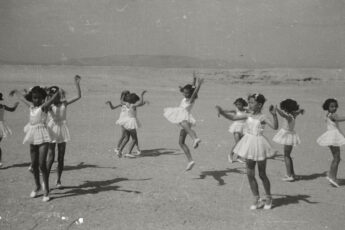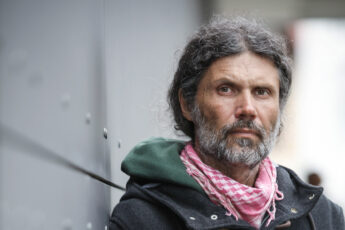
When the war started, we went to Istanbul”: so begins Daniil Lebedev’s short essay film Heaven and Home, a playful but poignant reflection on being displaced and being out of place. Told through the prism of the director’s own experiences of leaving Russia with a group of friends following the invasion of Ukraine, it roughly takes the form of an exploration of the Turkish island they find themselves on. Lebedev’s observations of his temporary “home” trigger broader ruminations on what it means to belong to or inhabit a given place.
The subjective perspective of the film is provided not by a voice-over but rather by a series of first-person subtitles overlaid on the images. Despite the lack of any vocals (a creative decision that is not only applied to the narration – the only character who speaks at any length with synch sound is a small boy), this text nevertheless manages to give the director a distinct voice. Succinct but carefully observed, the commentary has an almost diary-esque quality that adds a sense of intimacy, with notes of both wry humor and wistfulness.
The presentation of the text, which has a distinctive red outline and is embedded within the mise-en-scene rather than at the bottom of the screen, fits in with the strong stylization of the first half of the film. Part Nouvelle Vague, part nostalgic tourist video, the early scenes take us on a tour of the island with handheld shots of warm, saturated, summery colors set to jazz music with an equally syncopated montage.
This leads us to a Turkish flag placed at the highest summit, which in turn leads to a contemplation of flags in general and the Russian flag in particular. Through a sequence of archive footage, Lebedev looks back on the transition from the Soviet flag to the current Russian flag, which was originally intended as a symbol of a new democracy but instead ended up being co-opted for nationalist warmongering. As such, those who don’t feel represented by the current iconography are now proposing yet another iteration, one without the red stripe. In the words of Garry Kasparov, “The future Russia should not have blood on its flag”. Aside from marking the film’s shift towards a more essayist approach, this section also serves to make the filmmaker’s anti-war stance explicit, in case that wasn’t already clear from the act of leaving Russia.
Further investigations of the island uncover empty, abandoned spaces, revealing the cracks in the façade of this paradise. This is where the film’s confessional moment comes in – the images that appear to be shot on super 8 celluloid were in fact filmed on a phone and altered with a filter. Everything is simulacra. This heaven, such as it is, is not home. However idyllic it appears on the surface, island life is just a facsimile of normality, with no prospects for integration or taking root. The frame extends out from 4:3 to 16:9 and the images are shown in a (more) natural state. The frame becomes static while the music stops and diegetic sound reappears. This feeling of putting on a superficial front is visually expressed through a montage of buildings in a state of disrepair covered in idealized graphics of themselves, this attempt to mask the decay actually rendering it more obvious and sad.
The rest of the film is dedicated to notions of displacement and not fitting in, both in terms of the island itself but also the group’s countries of origins – one is from China but doesn’t want to go back, another was born in Azerbaijan but left at such a young age she has no connection to it. They are at the mercy of the immigration bureaucracy, which does not rule in their favor, putting an end to their time in Turkey. Meanwhile, the stream of tourists keeps passing through, taking the same cliché photos. After all, stays on the island are only ever supposed to be temporary and shallow for non-locals.
It’s slightly surprising that there have been so few films on the topic of protest migration, given how many people have left Russia and what the effect on the places they have moved to has been. Clearly, festivals are still reluctant to program Russian films of any kind, and there is likely a sense of self-censorship on the part of the filmmakers themselves. Heaven and Home shows that it is perfectly possible to address this issue with sensitivity, subtlety, and creativity. It is not a film that asks for pity (which is also appropriate given that it’s about living on a Mediterranean island), nor for praise for having made the effort to leave Russia. It is simply a philosophical account of an experience that many people can relate to even without being directly affected by conflict. Migration is one of the great topics of our times, and in the end many of us will end up finding ourselves somewhere we don’t belong and trying to make the best of it.




Leave a Comment